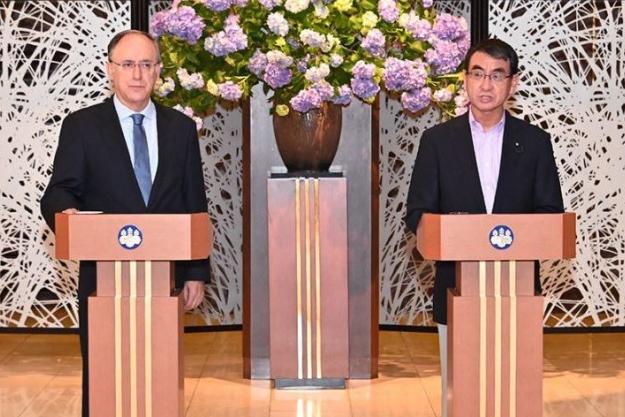
OPCW Director-General, H.E. Mr Fernando Arias, and Japan's Minister of Foreign Affairs, H.E. Mr Taro Kono. Photo Credit: Ministry of Foreign Affairs of Japan
THE HAGUE, Netherlands — 24 June 2019 — The Director-General of the Organisation for the Prohibition of Chemical Weapons (OPCW), H.E. Mr Fernando Arias, spoke about international efforts to eliminate chemical weapons and paid his respects to the victims of the atomic bombing of Hiroshima during a visit to Japan from 17-21 June. Throughout the visit, which was organised at the invitation of the Ministry of Foreign Affairs of Japan, the Director-General was accompanied by the Ambassador of Japan to the Netherlands and Permanent Representative to the OPCW, H.E. Ambassador Hiroshi Inomata.
On 18 June, the Director-General addressed an audience at the Integrated Center for United Nations and Foreign Affairs Studies at Kwansei Gakuin University in Osaka, where in a guest lecture he detailed recent efforts by the OPCW to prohibit and respond effectively to the use of chemical weapons around the world.
He detailed the OPCW’s progress and achievements, such as the approaching completion of the destruction of all declared chemical weapons. Recounting the “rude awakening” experienced by the international community after such weapons use in Syria, Iraq, Kuala Lumpur airport and the United Kingdom, the Director-General stressed that “the international community cannot afford complacency, despite the serious tasks carried out by the Organisation in the last 22 years”.
“Peace and security can never be taken for granted. We must consciously, collectively and in unity continue to work for those goals,” he told the audience.
The Director General further travelled to Hiroshima’s Peace Memorial Park, which commemorates the victims of the atomic bombings in 1945. He was given a tour of the Peace Memorial Museum, heard the testimony of a survivor, and laid a wreath at the Victims Memorial Cenotaph.
During his stay in Tokyo from 19 to 21 June, the Director-General held a series of bilateral meetings with a number of ministers and senior officials, including: Minister for Foreign Affairs, H.E. Mr Taro Kono; Minister of Defense, H.E. Mr Takeshi Iwaya; Minister for Science and Technology Policy, H.E. Mr Takuya Hirai; State Minister of Economy, Trade and Industry, Mr Yoshihiko Isozaki; and Director General of the Non-Proliferation, Disarmament and Science Department at the Ministry of Foreign Affairs, Mr Tomoyuki Yoshida.
On 21 June, the Director-General visited the Japan Self-Defense Forces (JSDF) Chemical School in Omiya, outside of Tokyo where he received a comprehensive briefing on the capabilities of the Chemical School.
Later during the same day, the Director-General attended a Tokyo seminar hosted by the Center for the Promotion of Disarmament and Non-proliferation, where he spoke about the most pressing challenges currently facing the Chemical Weapons Convention. Key highlighted issues included the use of chemical weapons, the on-going threat of chemical terrorism, and the possibility of using rapidly developing science to harm humankind. The Director-General expressed his confidence about the future stressing that “with challenges come opportunities.” In conclusion, he stated: “[W]e have a strong international consensus against chemical weapons. The Organisation represents the singular body that can continue to translate this consensus into effective action.”
Closing the visit, Minister for Foreign Affairs, H.E. Mr Taro Kono, and the Director-General held a working dinner during which the Director-General expressed appreciation for Japan’s strong commitment to the prohibition of chemical weapons and its support for the activities of the OPCW, and stated that the OPCW is looking forward to further close cooperation with Japan.
The Foreign Minister highly evaluated the important role of the OPCW in tackling the repeated use of chemical weapons and stated that Japan intends to develop further cooperative relationship with the OPCW to eliminate chemical weapons and prevent their reemergence. Both sides exchanged their views on strengthening the regime of the Chemical Weapons Convention and confirmed their collaboration in their efforts.
Background
Japan joined the Chemical Weapons Convention in 1995 and is currently a member of the OPCW Executive Council.
As the implementing body for the Chemical Weapons Convention, the OPCW, with its 193 Member States, oversees the global endeavour to permanently eliminate chemical weapons. Since the Convention’s entry into force in 1997, it is the most successful disarmament treaty eliminating an entire class of weapons of mass destruction.
Over 97% of all chemical weapon stockpiles declared by possessor States have been destroyed under OPCW verification. For its extensive efforts in eliminating chemical weapons, the OPCW received the 2013 Nobel Peace Prize.
More Information
- Lecture by the Director-General of the OPCW, Fernando Arias, at the Integrated Center for UN and Foreign Affairs Studies at Kwansei Gakuin University
- Speech by the Director-General of the OPCW, Fernando Arias, at the Center for the Promotion of Disarmament and Non-proliferation (CPDNP), “The Chemical Weapons Convention in 2019: Building on past successes and to address current challenges”
- Japan at the OPCW
